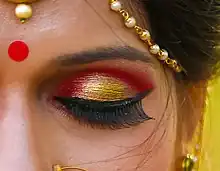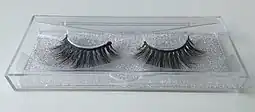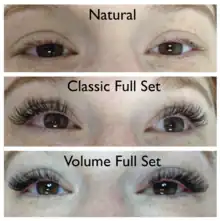False eyelashes
False eyelashes are a cosmetic enhancement attaching synthetic or natural fibers to the natural eyelashes to create a fuller, more dramatic look. They are available in various lengths, thicknesses, and curvatures.
History

In 1882, Henry Labouchère of Truth reported that "Parisians have found out how to make false eyelashes" by having hair sewn into the eyelids.[1] A similar report appeared in the July 6, 1899, edition of The Dundee Courier which described the painful method for elongating the lashes. The headline read, "Irresistible Eyes May Be Had by Transplanting the Hair." The article explained how the procedure achieved longer lashes by having hair from the head sewn into the eyelids.[2]
In 1902, German-born hair specialist and noted inventor Karl Nessler patented "A New or Improved Method of and Means for the Manufacture of Artificial Eyebrows, Eyelashes and the like" in the United Kingdom.[3] By 1903, he began selling artificial eyelashes at his London salon on Great Castle Street.[4][5] He used the profits from his sales to fund his next invention, the permanent wave (perm) machine.[6][7] In 1911, a Canadian woman named Anna Taylor patented false eyelashes in the United States. Taylor's false eyelashes had a crescent-shaped strip of fabric which had tiny pieces of hair placed on it.[8] Another noted inventor of false eyelashes is Maksymilian Faktorowicz, a Polish beauty guru and businessman, who founded the company Max Factor.[9]
.jpg.webp)
In 1916, while making his film Intolerance, director D. W. Griffith wanted actress Seena Owen to have lashes "that brushed her cheeks, to make her eyes shine larger than life." The false eyelashes, which were made from human hair, were woven by a local wig maker. The eyelashes were adhered using spirit gum. One day, Owen showed up to sit with her eyes swollen nearly shut, her co-star Lillian Gish wrote in her memoir.[10]
By the 1930s, false eyelashes were becoming more widespread. False eyelashes were featured in Vogue.
_(cropped).jpg.webp)
In the 1960s, eye makeup that made the eyes appear larger was very common. This look was achieved by applying false eyelashes on both the top and bottom eyelashes. Twiggy helped popularize the trend. In 1968 at the feminist Miss America protest, protestors symbolically threw a number of symbolic feminine products into a "Freedom Trash Can", including false eyelashes.[11] [12]
In 2014, Katy Stoka, founder of One Two Cosmetics, invented magnetic false eyelashes as an alternative to those that utilize glue.[13]
Temporary false lashes

Temporary false lashes are applied to the root of the eyelashes with temporary lash glue and are not designed to be worn when showering, sleeping or swimming. The lashes come as individuals, clusters, and most commonly, lash strips.
Magnetic lashes work by placing the magnetic false lash between one's eyelashes, thereby sandwiching the natural eyelashes with magnetic eyelashes.[14]
Eyelash extensions

In the United States, each state individually regulates eyelash extensions. Some states require either a cosmetology or esthetician license; some states have a certificate or license specifically for lash technicians.
In the United Kingdom, the Guild of Professional Beauty Therapists accredited courses for the safe application of semi-permanent individual eyelash extensions. The value of the course content can be judged by the number of CPD (Continued Professional Development) points that the course is awarded.
See also
References
- George Frederick Shrady and Thomas Lathrop Stedman (1882). Medical Record, Volume 22. p. 252.
- "Irresistible Eyes May Be Had by Transplanting the Hair". The Dundee Courier. The Quack Doctor. 6 July 1899.
- "A New or Improved Method of and Means for the Manufacture of Artificial Eyebrows, Eyelashes and the like Archived 2017-10-01 at the Wayback Machine". British patent GB000190218723A, submitted August 26, 1902, approved November 6, 1902.
- Williams, Neville (1957). Powder and Paint: A History of the Englishwoman's Toilet, Elizabeth I–Elizabeth II. Longmans, Green. ISBN 9787250004040.
- "Art Eyelashes". Nashua Daily Telegraph. July 14, 1903. p. 3.
- "Hair Waving Machine is 50 Years Old". The Milwaukee Sentinel. September 21, 1934. p. 11.
- "Beauty Boon Has Made Many Changes in 50 Years". Rome News Tribune. p. 28.
- "ARTIFICIAL EYELASH". Anna Taylor, Ottawa. Ontario. Canada. Serial No. 607,810. US994619. Filed February 10, 1911.
- "Maksymilian Faktorowicz – człowiek, który dał nam sztuczne rzęsy" [Maksymilian Faktorowicz – the man who gave us false eyelashes]. Polskie Radio (in Polish). 29 September 2017.
- "A True History of False Eyelashes". 7 October 2015. Retrieved 6 September 2019.
- Dow, Bonnie J. (Spring 2003). "Feminism, Miss America, and Media Mythology". Rhetoric & Public Affairs. 6 (1): 127–149. doi:10.1353/rap.2003.0028. S2CID 143094250.
- Duffett, Judith (October 1968). WLM vs. Miss America. p. 4.
{{cite book}}:|work=ignored (help) - Maheshwari, Sapna (25 August 2017). "In Social Media Era, Selfies Are the New Tupperware Party". The New York Times. Retrieved 19 September 2018.
'I thought, this is a product that will go viral because lashes make everyone look better, particularly in pictures—that's why a lot of brides get them,' said Katy Stoka, the creator of the magnetic lashes, known as One Two Lash. She added, 'Then it came in tandem with the obsession with the selfie.'
- Sasso, Samantha (1 July 2016). "One Two Lash – New Magnetic False Extensions". Refinery29. Retrieved 19 September 2018.
Katy Stoka of One Two Cosmetics has created a new and easy way to get an effortlessly winged-out look minus the glue ... magnetic lashes. ... The lashes come in four different styles, ranging from very natural to total glam, and work by sandwiching your actual lashes using two magnetic layers of falsies.
External links
- The History of Women and Their Eyelashes at MarieClaire.com
- History of Artificial (false) Eyelashes at Cosmetics and Skin